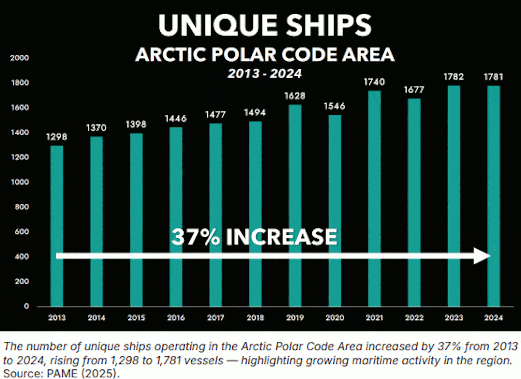
"Despite more than fifteen years of debate, the IMO,
the United Nations Maritime Navigation Body,
Keep ignoring the easiest solution: request
ships to switch to cleaner fuels immediately
when they operate in the Arctic." Kay Brown pointed this out,
Director of Arctic Policy of the environmental organization
Pacific Environment, presenting the report "On thin ice: Why
black carbon demands urgent action" carried out by Pacific
Environment and Clean Arctic Alliance to assess the impact of the
maritime transport on the Arctic region. Impact of the document
highlights to be worrying: "Despite the investigations
and the call for voluntary action by the IMO -
Brown explained - the black carbon emissions from the
maritime transport in the Arctic continues to grow rapidly
uncontrolled. Without mandatory requirements, markets do not have the
certainty needed to steer fleet operations towards
low black carbon options. We call on the IMO to
to respond to this Arctic crisis and to urgently address the
growing impact of black carbon on health and humans".
The report highlights that the expansion of maritime transport
in the Arctic region is causing an increase in the release of
in the air of black carbon, which then settles on snow and ice
accelerating its dissolution. The fastest result
Arctic sea ice retreat is opening up new routes of
by extending the period in which navigation in the
region is practicable, with the effect of aggravating the
problem. The document explains that, according to the status report
of the Protection of the Arctic
Marine Environment (PAME), the number of ships transiting
in the Arctic increased from 1,298 in 2013 to 1,781 in 2024,
with an increase of +37%, while the cumulative distance traveled
within polar waters increased by +108%,
going from 6.51 million to 12.7 million nautical miles. The
fishing vessels account for the largest share (34%) of this distance
bulk carriers, icebreakers and research vessels that
hold significant shares.
Ahead of the meeting of the Pollution Prevention Subcommittee
and Response (PPR) of the Marine Environment Protection Committee
(MEPC) of the IMO, scheduled from 9 to 13 February 2026, the report
calls on the International Maritime Organisation to impose a swift
transition to 'polar fuels' for use in the
arctic region, fuels that are more suitable to be used
in this area to reduce the environmental impact of shipping,
a measure that would produce immediate benefits. The document recalls that,
After carbon dioxide, black carbon is considered the
second main cause of global warming caused by the
maritime transport and one of the causes of the rapid dissolution of the
sea ice. Between 2015 and 2021, black carbon emissions
related to maritime transport in the Arctic have almost doubled and
global level, about 20% of the total climate forcing of the
shipping is due to black carbon.
